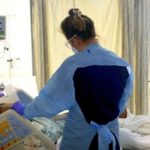NJSNA To Congress: Nurse Staffing Shortages Make Nation Sick
N.J. Nurses Warn Capitol Hill About Next Health Care Crisis
 The New Jersey State Nurses Association (NJSNA) recently announced that Congress must act to protect nurses, who are the underpinning of the U.S. health care system.
The New Jersey State Nurses Association (NJSNA) recently announced that Congress must act to protect nurses, who are the underpinning of the U.S. health care system.
NJSNA CEO Judy Schmidt told lawmakers this summer that burnout is making more nurses ill. The workplace syndrome is characterized by high emotional exhaustion, cynicism and a low sense of personal accomplishment.
During the Washington, D.C. visit, Schmidt told elected officials that staff shortages, high workloads, extended shifts and lack of support are driving nurses to leave the profession—and low graduation rates are making the situation worse. NJSNA’s contingent met with staff members from the offices of New Jersey’s U.S. Senators Robert Menendez and Cory Booker, and New Jersey Representatives Jeff Van Drew, Bonnie Watson Coleman and Andy Kim.
“Action speaks louder than words,” said Schmidt, DHA, MSN, RN. “Experienced nurses are leaving because they are overworked and stressed out. Younger talented candidates see the frustration and opt for other professions. We can avert the next health care crisis if we work together today.”
NJSNA shared research from the American Nurses Association with lawmakers during its recent visit to Capitol Hill:
- 75% of nurses feel stressed, frustrated and exhausted.
- Two-thirds of RNs younger than 35 years reported feeling burned out.
- 19% of nurses younger than 35 believe their organizations care about their wellbeing.
- 89% of nurses report a shortage at their facility with 54% characterizing the situation as a “serious problem.”
According to the U.S. Department of Health and Human Services, New Jersey will encounter one of the worst nursing shortages in the nation by 2030.
The percentage of unfilled positions for registered nurses in New Jersey hospitals increased 13.4% last year, according to the New Jersey Hospital Association (NJHA). The survey found that hospitals in the Garden State spent about $500 million in overtime in 2020 and $592 million in 2021. The expenditures don’t include the fees paid to travel and agency workers, which made an additional $222 million in 2020 and a projected $670 million in 2021.
To learn more about the New Jersey State Nurses Association, please visit njsna.org.



